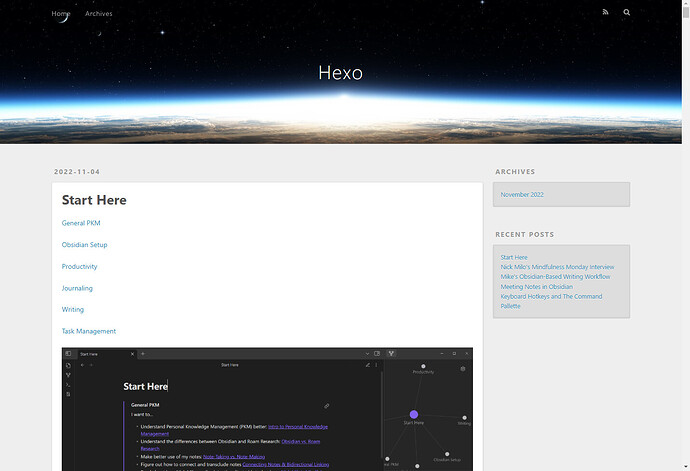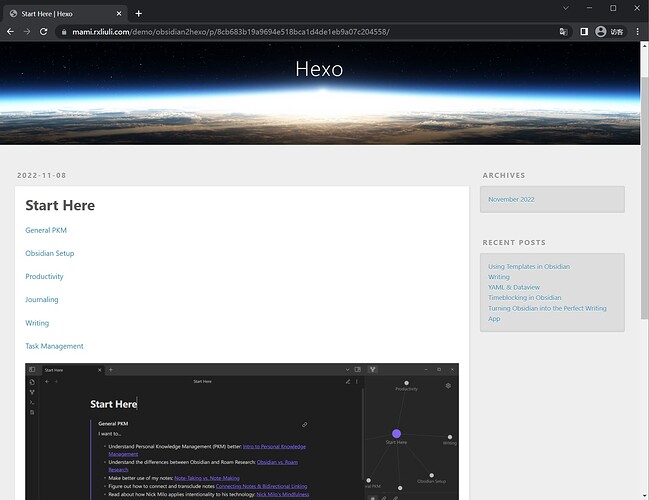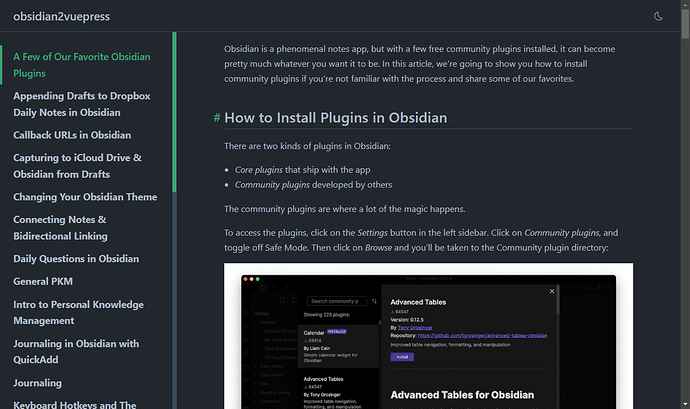I created this tool and tried to support obsidian, just wanted to make a statement here!
Introduction
Mami is a conversion tool that can connect different markdown-based frameworks and tools, and can convert the data of one tool to another tool, which is very helpful for cross-application migration and multi-platform release, currently known joplin/obsidian/hexo/hugo/raw, plans to support docsify/vuepress.
Some practical use cases are to export a portion of obsidian notes as a note or wiki instead of manually copying to a specific location. And directly use the existing framework, you can publish it to github pages and other places for online access.
Usage
Requirements
- you need to install nodejs 18
Step 1: Create a new project
The following uses pnpm as the package manager, but you can replace it with npm
Create a hexo project
pnpx hexo init obsidian2hexo-demo && cd mami-starter
Step 2: Install mami
Add @mami/cli and typescript as development dependencies of the project
pnpm i -D @mami/cli typescript
Add some scripts to package.json
{
...
"scripts": {
"gen": "mami"
},
...
}
Create your config file mami.config.ts
import { defineConfig } from '@mami/cli'
export default defineConfig({
input: [],
output: [],
})
then run
$ pnpm run gen
> [email protected] gen
> mami
start
end
Well, nothing happens because you have no input or output plugin defined. Continue to the next step.
Step 3: Install the required plugins
Install the required plug-ins to connect the required tools. Here we use joplin => obsidian as an example
pnpm i -D @mami/plugin-obsidian @mami/plugin-hexo
Modify your config file mami.config.ts
import { defineConfig } from '@mami/cli'
import * as obsidian from '@mami/plugin-obsidian'
import * as hexo from '@mami/plugin-hexo'
import path from 'path'
export default defineConfig({
input: [obsidian.input({ root: path.resolve(__dirname, './obsidian-source') })],
output: [hexo.output({ root: __dirname })],
})
Step 4: Perform the conversion
Then you can rerun the following command
pnpm run gen
Now you will see the converted obsidian file in _source/post and source/resources
Then, start the hexo local server
pnpm hexo server
you got a website
plugins
Roughly speaking, plugins are divided into input and output plugins. The input plugin will return an AsyncGenerator, while the output plugin will return an AsyncGenerator will consume it in the handle hook function.
Intermediate format
{
"id": "0e2510c9272449dbafe3e0f3fba12d74",
"title": "Welcome to Joplin!",
"content": "content body",
"createAt": 1666288266591,
"updateAt": 1666288266591,
"path": ["Welcome! (Desktop)"],
"tags": [
{
"id": "04dfa5cf19e4435f9f3f09a73a7edfb2",
"title": "blog"
}
],
"resources": [
{
"id": "63b83e548b7b4adfae18544b7038b0bc",
"title": "AllClients.png",
"raw": "<nodejs buffer>"
}
]
}
Writing plugins involves some markdown ast operations. For example, you may need to convert links in markdown. It is recommended to use mdast to handle it.


